ECLAC Participates in Intergovernmental Conference on the Global Compact for Migration in Marrakech
Work area(s)
Alicia Bárcena, the organization’s Executive Secretary, spoke on various panels during the two-day global gathering. On Sunday, December 9, meanwhile, she led a side event organized by the five United Nations regional commissions.

The Executive Secretary of the Economic Commission for Latin America and the Caribbean (ECLAC), Alicia Bárcena, delivered remarks at various sessions in the framework of the intergovernmental conference to adopt the Global Compact for Safe, Orderly and Regular Migration, which took place in Marrakech, Morocco on December 10-11, 2018.
In these presentations, the senior United Nations official addressed the Global Compact for Migration’s importance from a regional perspective, along with the urgency of multilateral cooperation and regional integration to confront both regional and global challenges in matters of migration.
Alicia Bárcena’s participation began on Sunday, December 9, at the side event Regional Dimensions in the Implementation, Follow Up and Review of the Global Compact for Migration, organized by the United Arab Emirates (UAE), the International Organization for Migration (IOM) of the United Nations, and the Migrant Forum in Asia.
During the event, participants reflected on regional cooperation to help United Nations Member States in the implementation, follow-up and review of the Global Compact for Safe, Orderly and Regular Migration.
The event was inaugurated by Nasser Al Hamli, Minister of Human Resources and Emiratisation of the UAE; Louise Arbour, Special Representative of the Secretary-General for International Migration; Antonio Vitorino, Director General of IOM; and Alicia Bárcena, ECLAC’s Executive Secretary.
Later in the day, ECLAC’s most senior representative headed a side event organized by the five United Nations regional commissions, which addressed the priorities, opportunities and challenges for the successful implementation of the Global Compact on a regional level.
The event Regional Perspectives on the Global Compact for Safe, Orderly and Regular Migration also analyzed the role that the UN regional commissions can play in the process of follow-up and review of that implementation.
At that event, Alicia Bárcena, in her capacity as representative of the UN regional commissions, delivered an inaugural address that led into a high-level panel on which participants included Luis Alberto Castiglioni, the Minister of Foreign Affairs of Paraguay; Nasser Al Hamli, Minister of Human Resources and Emiratisation of the United Arab Emirates; and Nirmal Raj Kafle, Deputy Permanent Representative of Nepal to the United Nations and the World Trade Organization, and other senior representatives from Africa, Asia-Pacific and Europe.
Other speakers included Mounir Tabet, Acting Executive Secretary of the Economic and Social Commission for Western Asia (ESCWA); Thokozile Ruzvidzo, Director of the Social Policy Division of the Economic Commission for Africa (ECA); Paulo Saad, Chief of the Latin American and Caribbean Demographic Center (CELADE)-Population Division of ECLAC; and Sabine Henning, Chief of the Sustainable Demographic Transition Section of the Social Development Division at the Economic and Social Commission for Asia and the Pacific (ESCAP).
The agenda of ECLAC’s Executive Secretary continued on Monday and Tuesday, December 10 and 11, with participation in the intergovernmental conference’s plenary debate. After that she presented, along with the foreign ministers of El Salvador, Guatemala, Honduras and Mexico, the Plan for Comprehensive Development initiative, which seeks to promote development and opportunities in Central America, contributing to the prevention of the migratory phenomenon and attacking its structural causes.
During her participation in the conference, the senior United Nations official also presented to countries the Atlas of Migration in Northern Central America, produced by ECLAC and the United Nations Food and Agriculture Organization (FAO), which brings together and organizes the best statistical data available as a contribution to the characterization of migratory patterns in the countries that make up that part of the region, with the aim of contributing to the design of policies, programs and diverse forms of action that benefit safe, orderly and regular migration in the region of Latin America and the Caribbean.
Related content
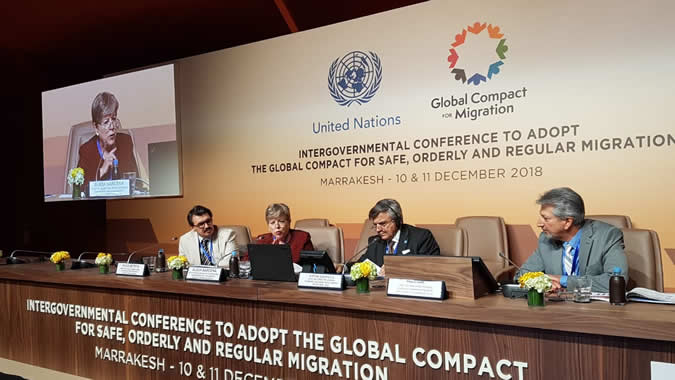
Young People Under 24 from Rural Areas Constitute the Greater Part of Emigration from Northern Central America
In Marrakech today, ECLAC and FAO presented a document that examines the main causes and salient characteristics of the migratory phenomenon in countries of the subregion.
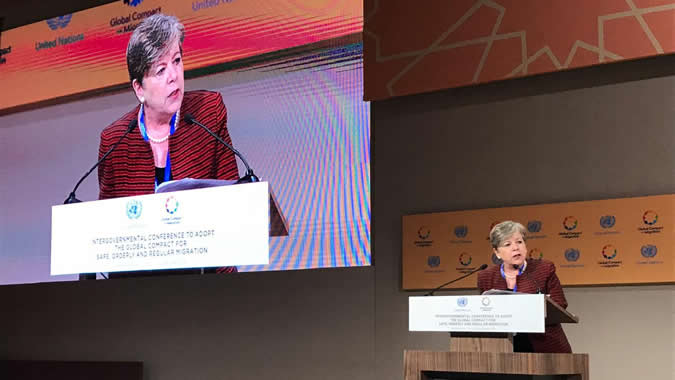
The Global Compact is a Historic Opportunity to Recognize the Triad of Rights, Development and Migration: ECLAC
Alicia Bárcena, the organization’s Executive Secretary, participated today in the plenary debate of the Intergovernmental Conference on the Global Compact for Migration in her capacity as…

Understanding and Addressing Regional Dimensions is Crucial for Guaranteeing Safe, Orderly and Regular Migration
Alicia Bárcena, ECLAC’s Executive Secretary, participated today in the Intergovernmental Conference on the Global Compact for Migration, being held in Marrakech.
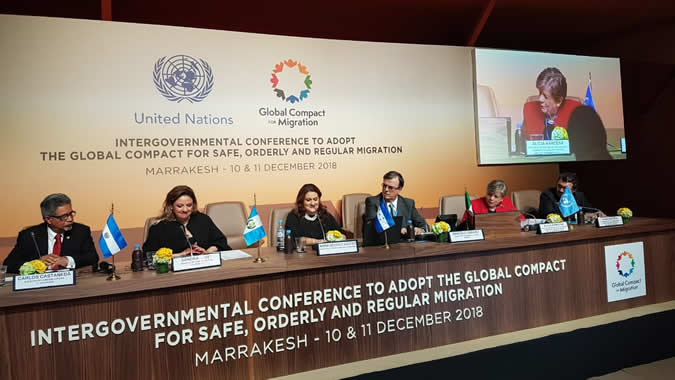
Foreign Ministers of El Salvador, Guatemala, Honduras and Mexico Presented Comprehensive Development Plan in the Framework of the Conference on the Global Compact for Migration
The regional initiative will change the paradigm of migration, development and cooperation between northern Central America and Mexico, under ECLAC’s auspices.
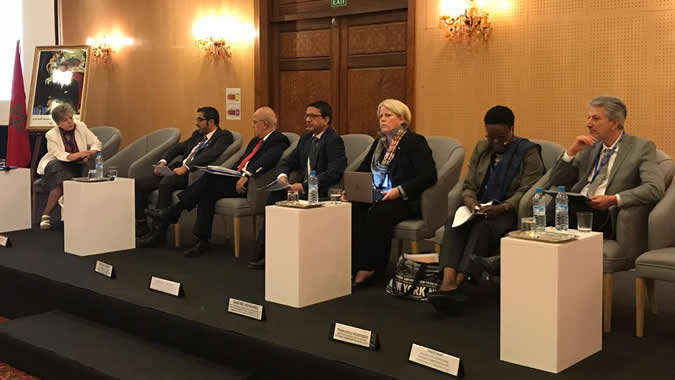
Pacto Mundial para la Migración otorga un marco de principios comunes no vinculantes para afrontar un tema transfronterizo por naturaleza: Alicia Bárcena
At the start of her participation in the Intergovernmental Conference for Migration that is being held in Marrakech, Morocco, ECLAC’s Executive Secretary addressed the global agreement’s relevance…
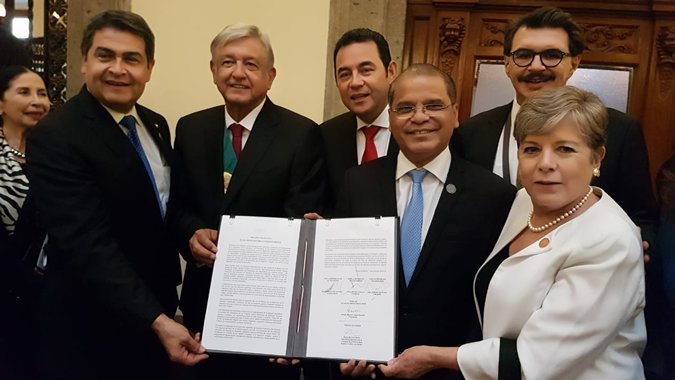
CEPAL apoyará diseño e implementación de Plan de Desarrollo Integral impulsado por El Salvador, Guatemala, Honduras y México
Alicia Bárcena, Secretaria Ejecutiva del organismo regional, asistió hoy como testigo de honor a la firma de una declaración de desarrollo e inversión, suscrita por los cuatro países en Ciudad de…
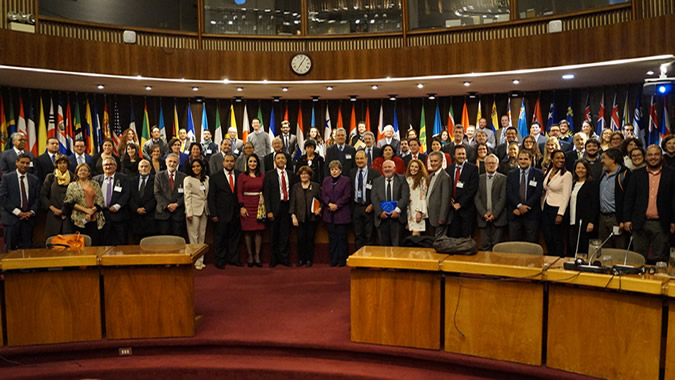
América Latina y el Caribe reafirma compromiso con Pacto mundial sobre migración
La primera consulta regional de expertas y expertos en migración internacional, organizada por la CEPAL y la OIM, culminó el jueves con un llamado a alcanzar un acuerdo global ambicioso, centrado en…
Latin America and the Caribbean vis-à-vis the Global Compact for Safe, Orderly and Regular Migration
Op-ed by Alicia Bárcena, Executive Secretary of ECLAC.
Contact
Public Information Unit
- prensa@cepal.org
- (56 2) 2210 2040